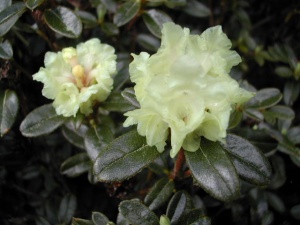Rhododendron
From Wikiwel
Other Names : Rhododendron anthopogon, Balu, Sunpati, Anthopogon tea
See also : Himalayan Red Honey.
Special Precautions of Rhododendron
- Parts of certain rhododendron species are toxic to both humans and animals. Some species of rhododendron are poisonous to grazing animals because of a toxin called grayanotoxin in their pollen and nectar. People have been known to become ill from eating honey made by bees feeding on rhododendron and azalea flowers.
- Avoid during pregnancy
- Do not use on babies or small children.
Health Benefits and uses of Rhododendron
Rhododendron species have long been used in traditional medicine. Animal studies and in vitro research has identified possible anti-inflammatory and hepatoprotective activities which may be due to the antioxidant effects of flavonoids or other phenolic compounds and saponins the plant contains. Xiong et al. have found that the root of the plant is able to reduce the activity of NF-κB in rats. Because of its high monoterpene content; specifically, alpha pinene, beta pinene, and d- limonene, research suggests that Rhododendron is a good anti bacterial, analgesic, anti inflammatory, anti spasmodic and liver protector and supporter.
- Antimicrobial : Italian researchers at the University of Padova studied the composition of an essential oil from the Rhododendron anthopogon species. They were able to isolate compounds that showed a significant killing effect against strains of bacteria like Staphylococcus aureus, Enterococcus faecalis, Bacillus subtilis and Mycobacterium tuberculosis and fungi like Candida. These antimicrobial effects were found with doses as low as 0.04 percent solution.
- Cancer : The same Italian study that discovered antimicrobial properties in rhododendron also determined that the essential oil reduced cancer cell growth independently of either the cell line or the treatment protocols used. Additional research published in the April 2010 issues of “Organic Letters” reported that a compound isolated from the flower buds of the Rhododendron molle species showed selective cytotoxic activity against a human hepatoma carcinoma cell line.
- Dermatitis : Patients with atopic dermatitis, a type of skin disorder similar to eczema, often have increased levels of eosinophils and pro-inflammatory factors. Researchers at China’s Chung-Ang University College of Medicine used extracts from the roots of Rhododendron mucronulatum that were either applied topically or injected into laboratory animals that had an atopic dermatitis condition. The mice exhibited measurable reduced levels of eosinophils and other inflammatory markers after treatment with the extract.
- Inflammatory Pain : In December 2009, the journal “Molecular Pain” published a study that looked at efforts to mediate persistent inflammatory pain. The experiment used Hyperoside, one of the flavonoids isolated from Rhododendron ponticum L., which significantly reversed the effects of NMDA pain receptors in the spinal cord and exhibited analgesic activities against persistent inflammatory stimuli in mice.
- Kidney and Liver Function : A study at China’s Tongji Medical College found that rhododendron root extracts were able to regulate kidney function. Two follow-up studies in India wanted to see whether extracts from Rhododendron arboreum had a similar positive role in the liver. An ethanol-based extract from the leaves was given to rats with induced liver damage in varying doses for five days, with results showing a definitely hepatoprotective property, possibly because of its reported antioxidant activity from the quercetin related flavonoids present in the plant.
- For sore throat
- to counteract water-earth illness
- Rhododendron essential oil is an effective decongestant and antispasmodic for the respiratory system. * * Detoxifier and kidney stimulator (adrenals).
- Skin : Rhododendron essential oil has a mild topical anti-inflammatory and antibacterial effect which can be beneficial for inflamed, troubled skin. It can also be added to shampoo for healthy, shiny hair.
- Mind : Rhododendron can have a tonic effect on the nervous system and can help to quieten an overactive mind. It is spiritually calming and grounding and is often used to support meditation. In Himalayan aromatherapy its balancing properties help to promote inner unity.
- The oil can be used topically to help reduce inflammation in the joints and muscles and to assist with rheumatic conditions including gout.
